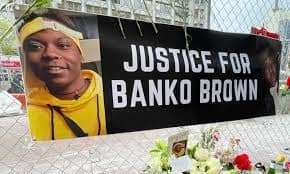
by Robbie Jackson
The death of Banko Brown has been the topic of discussion for more than one reason. The majority want to discuss the past and figure out what led the security guard to use deadly force on the young 24-year-old San Francisco local. Others choose to discuss the present impact the shooting of an unarmed Black person has on an already vulnerable community, and a couple people discuss the future solutions to prevent something like this from happening again.
Either way when you break down the tragic incident, the death of Banko Brown connects the community in an interesting intersectional way.
Banko was a San Francisco local personally affected by the housing crisis, pushed to the point of allegedly shoplifting – a common practice for those who struggle for the bare minimum in one of the most expensive cities in the nation. This is another case of a Black person wrongfully murdered over $14 worth of insured candy.
“San Francisco law currently states that private security guards can unholster their weapons – a serious and potentially deadly escalation – to protect property. That’s inconsistent with state training guidelines for security guards and sends a terrible message to guards and our communities. Property should never be placed above human life and our laws should be crystal clear on that.” says San Francisco Supervisor Dean Preston.
“That’s why we are introducing legislation to change San Francisco law to make it clear security guards should never draw weapons just to protect property.” Local San Francisco law currently states under Police Code Section 1750.20 that a guard may “draw or exhibit other than in a holster any handgun … in response to an actual and specific threat to person and/or property.
Property is the word Dean Preston is focusing on. “We intend to strike ‘and/or property’ from that provision. We recently announced our plan to introduce legislation to accomplish this and are working with the city attorney to finalize it. We expect to formally introduce it at our next Board of Supervisors meeting, which is on June 6.”
Housing and safety: Two major topics in the Black community we all can agree are basic necessities. Imagine being alive long enough to tell the police where they can find your loved ones. No parent wants that call. Yet too many Black parents experience it. “It was the worst day of my life to hear that. I was screaming, yelling, ‘No, no! This can’t be true.’” says Brown’s father, Terry Brown.
Like déjà vu we have seen and heard this story time and time again, Black children dying before their parents, the parents living long enough to turn their pain into advocacy. The complexity of this case continues when you factor in that Banko Brown was a member of the LGBTQI+ community.
He was known to advocate not just for himself, but for others as well. And just like the conversation hitting differently for each person in different ways, this case hits a little harder for their intersectional community. “I’m deeply sorry and feel so much empathy for the family of Banko Brown. I hope that Banko’s family gets the justice that they are seeking for this tragedy,” says Timothy Hampton, associate director of programs at the SF LGBT Center.
“My connection to San Francisco is that as a queer and a Black man who lived in the South, I saw an opportunity to move to a more queer-friendly place and I took it!” Hampton goes on to say. “I am a queer Black cis-gender man that is very flamboyant in my actions … being raised in a religious household, identifying as LGBT/gender fluid was not talked about in a positive light. This conversation is hard to have in a lot of Black families.”
And it is. The conversation often isn’t productive and ends the same, with no resolution, which makes cases like the death of Banko Brown complex.
So many people hold responsibility in preventing this tragic death. The City we live in must better protect their most vulnerable community. They must acknowledge the years of systemic racism that cultivated a housing crisis that is out of control. They must provide reparations and resources that will aid in the recovery from that systemic oppression. They must do all they can to prevent this from happening again.
However, this tragedy is not just on them.
The community must advocate, listen and seek to understand a section of Blackness that at times seems voiceless. We must evoke our power collectively with no hesitation, not just for some Black people but for all Black people. If we the people hold the power to change things, then isn’t it on us, we the people, to create change even for those we may not understand?
In 1962 Dr. Martin Luther King is quoted saying: “Injustice anywhere is a threat to justice everywhere. We are caught in an inescapable network of mutuality, tied in a single garment of destiny. Whatever affects one directly, affects all indirectly. Never again can we afford to live with the narrow, provincial ‘outside agitator’ idea. Anyone who lives inside the United States can never be considered an outsider anywhere within its bounds.”
And in 2023 we as Black people still can’t afford to be divided, especially since tragedy continues to bring us together.
Robbie Jackson is a student of the San Francisco Bay View’s Community Journalism Class, which is funded by the California State Library.





